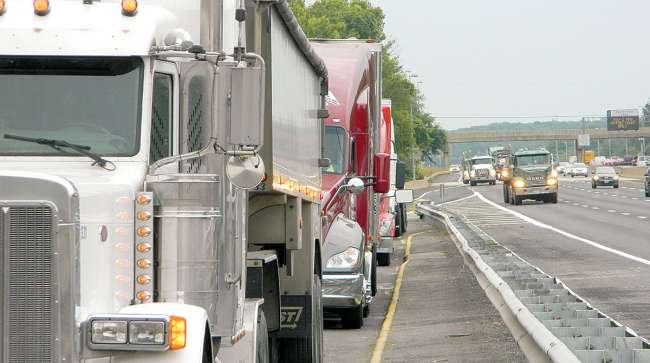Senior Reporter
ATA Challenges California’s Meal, Rest Break Rules in Petition to FMCSA

American Trucking Associations has petitioned the trucking industry’s top regulator to determine that California’s meal-and-rest-break requirements are pre-empted under federal regulations.
ATA’s petition to the Federal Motor Carrier Safety Administration, in an effort to ensure nationwide uniformity of meal-and-rest-break rules for commercial drivers, argues that duplicative state break rules hinder safety, are incompatible with federal regulations and create an unreasonable burden to interstate commerce.
HOUSE PASSES FAA BILL: Measure heads to Senate minus meal and rest break provision
The petition cites federal regulation that affords the Secretary of Transportation authority not to enforce such state requirements on commercial vehicle safety that conflict with safety or hinder interstate commerce.
“Any imposition of arbitrary state break rules like California’s will inevitably disrupt the flexible [hours-of-service] framework that the agency has deemed appropriate to the needs of highway safety, with palpable negative impacts ‘on commercial motor vehicle safety,’ ” the group wrote in its petition Sept. 24. “By arbitrarily forcing trucks off the road more frequently, state rules like California’s also contribute to a critical shortage of truck parking, with serious safety implications.”
“Any increase in the time commercial drivers spend on arbitrary breaks, and the frequency with which they take them, entails a proportionate increase in the demand for scarce parking,” according to the petition. “For the agency to nevertheless characterize state break rules as anything other than ‘on commercial motor vehicle safety’ would be a gross dereliction of its duty to exercise its authority over highway safety as its ‘highest priority.’ ”
Meal, rest break letter to Transportation Secretary Elaine Chao by Transport Topics on Scribd
Jennifer Hall, ATA general counsel, emphasized that “duplicative state break requirements undermine safety and unreasonably burden interstate commerce.”
“ATA is committed to finding a solution to this issue, and this petition will allow the federal government to reassert its authority and affirm one national standard in regard to meal and rest breaks,” Hall said.
FMCSA did not return a request for comment on the petition as of press time.

Chao
In a letter to Transportation Secretary Elaine Chao obtained by Transport Topics, a bipartisan group of House and Senate transportation leaders expressed support for a review by U.S. DOT on the impact state meal-and-rest-break requirements could have on the trucking industry.
“The trucking industry has raised concerns that state meal-and-rest-break laws cause a significant impact on the industry and impair the safe and efficient delivery of goods,” the lawmakers wrote Sept. 25. “Safety can be undermined when duplicative or conflicting requirements interfere with uniform, clear federal requirements.”
Signing the letter were Senate Commerce Secretary John Thune (R-S.D.), and House Transportation and Infrastructure Committee Chairman Bill Shuster (R-Pa.), as well as Republican Reps. Jeff Denham of California and Sam Graves of Missouri, chairmen of the subcommittees on railroads and highways, respectively. Democrats included Sens. Bill Nelson of Florida, Jon Tester of Montana and Heidi Heitkamp of North Dakota, along with Rep. Henry Cuellar of Texas.
Meal, rest break petition to FMCSA Administrator Ray Martinez by Transport Topics on Scribd
This year, ATA officials sought to address concerns about California’s meal-and-rest-break rules legislatively. A provision that was designed to ensure nationwide uniformity on meal-and-rest-break rules for truck drivers had been included in earlier versions of House and Senate aviation reauthorization legislation. Lawmakers, however, excluded the trucking provision in a final version.
Specifically, the provision was meant to clarify a 1994 law to block a California law on meal and rest breaks. That law in California, from 2011, requires employers to provide a “duty-free” 30-minute meal break for employees who work more than five hours a day, as well as a second “duty-free” 30-minute meal break for people who work more than 10 hours a day.
After weeks negotiating aviation policy, the House on Sept. 26 advanced the five-year bill that would authorize aviation safety and infrastructure programs set to expire at the end of the month. Senate leaders have indicated support for the aviation bill. It is unclear when the Senate would schedule a vote, after House passage.

